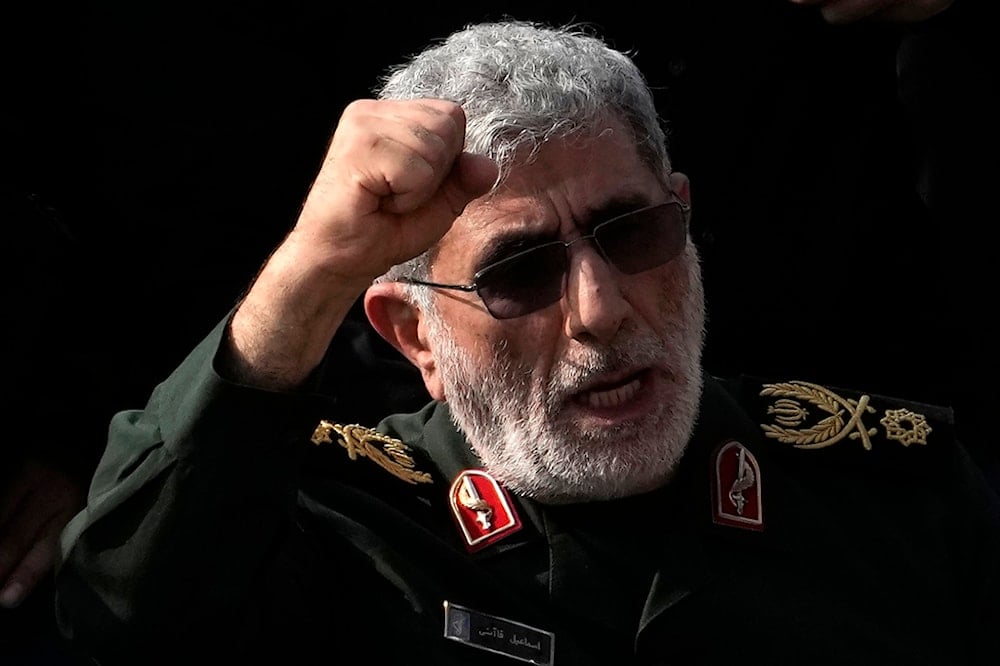Hezbollah reshaped Gaza war after Sayyed Nasrallah martyrdom: Qaani
Iran’s Quds Force commander Qaani says Hezbollah shifted Gaza war dynamics, stood firm after Sayyed Nasrallah's assassination, and exposed the Israeli occupation's weakness.
-

Commander of Iran's Islamic Revolution Guard Corps' Quds Force, General Esmail Qaani, in Tehran, Iran, Tuesday, October 15, 2024 (AP)
The commander of Iran’s Islamic Revolutionary Guard Corps Quds Force, Brigadier General Esmail Qaani, said on Friday that Hezbollah’s decision to open the support front after Operation Al-Aqsa Flood played a decisive role in shifting the course of the battle in favor of the Palestinian resistance.
In an interview with Iranian television, Qaani stressed that the move was taken by Hezbollah Secretary-General Sayyed Hassan Nasrallah “with wisdom and in defense of the oppressed,” significantly altering the dynamics of the war.
Qaani underlined that neither Tehran nor Hezbollah had prior knowledge of the October 7 operation, adding that even Hamas’ political leadership was unaware. He noted that Hamas political bureau chief Ismail Haniyeh was en route to Baghdad Airport when the operation began.
So Brig. Gen. Qaani says Iran (as well as Hezbollah and Hamas' Leaders) were completely unaware of the plans to carry out the October 7 operation... pic.twitter.com/rV61BV8LYV
— ساسان 🇮🇷 (@eghtesadnia) October 3, 2025
“One of Israel’s greatest crimes”
Addressing the assassination of Sayyed Hassan Nasrallah, Qaani described it as “one of the greatest crimes committed by Israel.” He said the operation involved not only explosives but “a large quantity of chemical agents,” which he asserted were the main cause of Nasrallah's martyrdom along with his companions.
Qaani accused global powers of backing “Israel” in its war on Lebanon, deploying the world’s most advanced military capabilities. Despite this, he said Hezbollah stood firm and thwarted Israeli plans, pushing back against claims that the group had been weakened by the war.
The Quds Force commander emphasized that despite limited resources, Hezbollah’s strength was evident in preventing “Israel” from advancing more than four kilometers inside Lebanon. He argued that this demonstrated the resistance’s effectiveness, even as the Israeli occupation carried out massacres with Western military support.
A strategic victory for the resistance
He also highlighted that the Israeli regime's psychological warfare was larger in scope than its military campaign, noting that the occupation was ultimately forced to request a ceasefire. “If Israel was capable of continuing the war, why did it seek a ceasefire?” he asked.
Qaani described the 66-day battle, known as Operation People of Might, as one of the most significant modern wars, saying Hezbollah showcased its full capabilities. He noted that when Hezbollah Deputy Secretary-General Sheikh Naim Qassem says the movement is ready for a “Karbala-style battle” if pressured, “it is not a slogan; the fighters have already proven it on the battlefield.”
Turning to Lebanon’s internal affairs, Qaani stressed that domestic issues must be resolved by the Lebanese themselves, reiterating that Iran does not interfere. He praised Hezbollah’s patience in the face of repeated Israeli ceasefire violations, calling it a “wise and correct decision.”
Hezbollah’s role in Lebanon
Qaani asserted that the Lebanese people and army recognize Hezbollah’s crucial role in safeguarding Lebanon. “The army has adopted a wise approach in dealing with Hezbollah despite external pressures,” he said, adding that Lebanon’s security cannot be guaranteed without the resistance.
He concluded by affirming that no matter how long aggression continues, “enemies cannot eliminate a single front of the resistance,” insisting that these battles only strengthen the movement. Qaani added that Hamas, despite being under siege, continues to manufacture weapons and strike the Israeli occupation.
Strategically, he said the resistance remains victorious: “In the battlefield we both receive and inflict blows, but on the strategic level we are absolute victors. The world is now witnessing the true, criminal face of Israel.”
Earlier this week, Iran’s Supreme National Security Council head Ali Larijani visited Lebanon to attend the commemoration of Sayyed Nasserallah’s martyrdom, emphasizing Hezbollah’s role as a strategic force in protecting Lebanon and praising its regional diplomacy, including with Saudi Arabia.

 4 Min Read
4 Min Read










